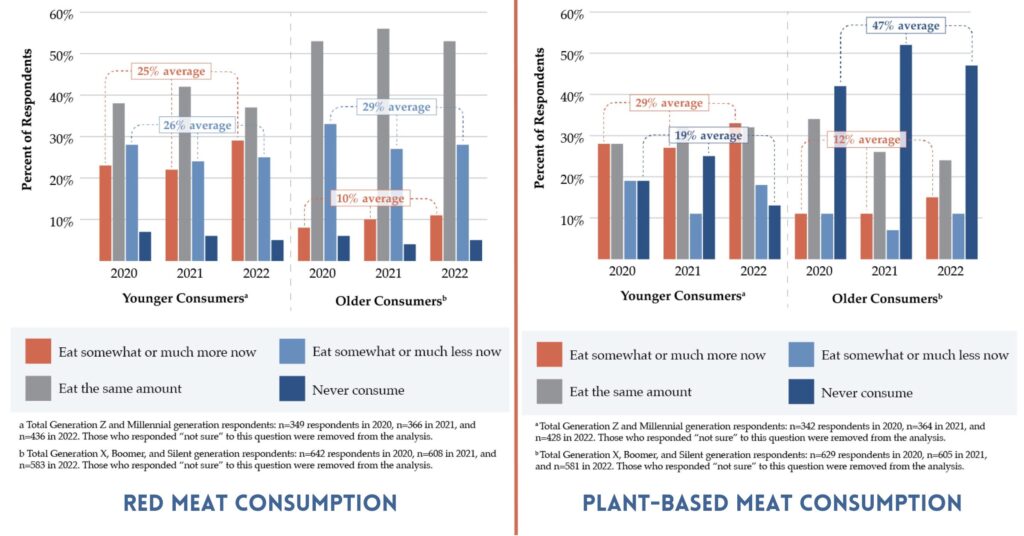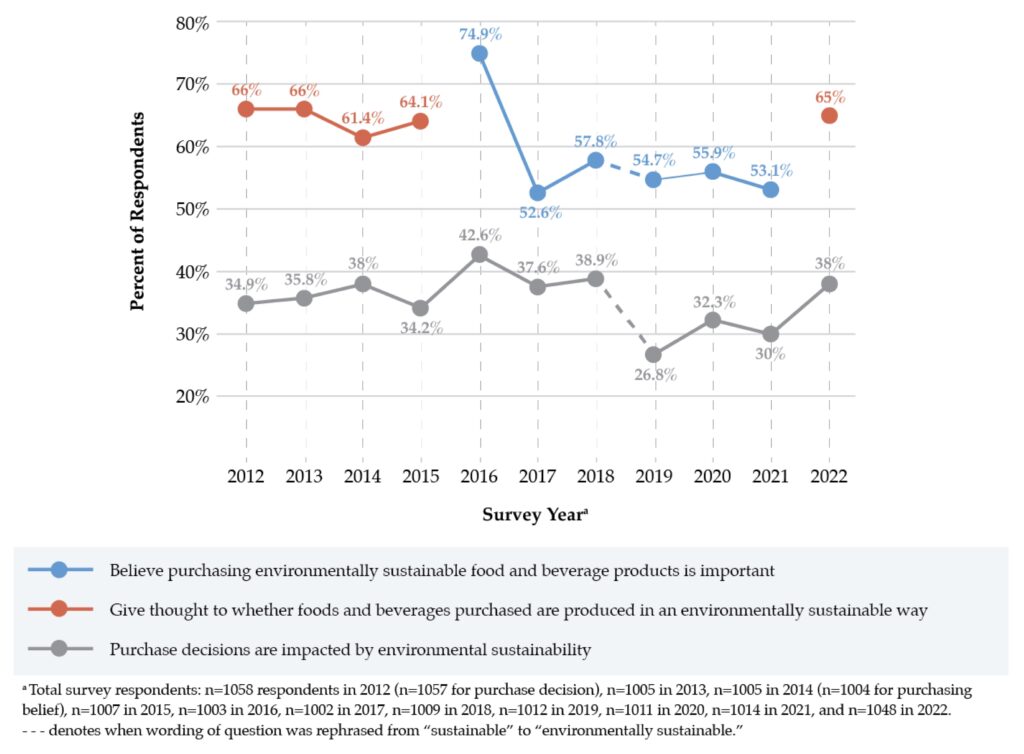Meat Paradox: Americans are Eating More Plant-Based, But Also More Red Meat
5 Mins Read
A majority of Americans recognise the health and environmental benefits of vegan food, yet only a quarter are willing to adopt plant-rich diets. Plus, there has been an increase in red meat consumption over the years, according to a new review.
Over the last year, multiple studies have highlighted the disconnect between Americans’ eating patterns and their attitudes towards climate change. For example, one survey suggested that 74% of them didn’t think eating meat was bad for the planet, while another found that the number of vegans was at a 10-year low. US consumers also eat way more meat than is recommended, and one study noted that meat consumption needs to come down by 82% if the country is to avoid more climate disasters.
Things become interesting when you look at longer-term trends, though. That’s exactly what researchers at Virginia Tech’s College of Agriculture and Life Sciences did, perusing national surveys from the International Food Information Council spanning 2012 to 2022 and examining how Americans eat. Published in the Nutrients journal, the analysis covered over 1,000 consumers, and found that they had a paradoxical view of meat and plant-based food consumption.
“US consumers have favourable perceptions of foods and beverages that support human and environmental health, but that’s not translating into what they’re purchasing and consuming,” explained lead researcher Katherine Consavage Stanley.
More plants, yet more meat

The review of the surveys found that 74% of Americans find plant proteins healthy, a number that drops sharply to 39% for animal protein. Between 2016 and 2019, the percentage of consumers believing that animal proteins were unhealthy increased from 10.3% to 16.4%, before falling to 15.4% in 2020. Meanwhile, between 2019 and 2020, 24% of respondents actively tried to consume animal proteins, and 23% attempted to limit or avoid them. More than a third (38%) looked to eat plant-based proteins in this time.
But despite the percentage of Americans following plant-rich diets more than doubling across the years surveyed, it still only made up about a quarter (26%) of the total. Gen Z and millennials were more likely to adopt these eating patterns than older consumers like Gen X, baby boomers and the silent generation. That said, adoption of plant-forward diets has risen across generations over time, reaching 37% for young consumers and 17% for older Americans.
However, this has coincided with a rise in red meat consumption too, with the number of people who reported eating more red meat increasing from 13% in 2020 to 19% in 2022, and those who reduced their intake dipping from 31% to 27%. Surprisingly, younger Americans were much more likely to report greater red meat consumption (25%) than older respondents (10%). There has been a shift around wealth too, with lower-income Americans likely to report eating more red meat until 2021, before being eclipsed by those with higher incomes.
As for the number of people eating meatless diets, this amounts to an average of 5% over the years, while flexitarians have increased from 2% to 7% from 2019-22. “Low adoption of plant-rich dietary patterns may be due to a lack of consumer awareness of these dietary patterns or knowledge of their health benefits,” the study suggested, adding that taste disparities and food access also play a role here.
The researchers highlight a need for “the provision of greater consumer education by nutrition and health professionals regarding the health, environmental, and animal welfare benefits of adopting such pattern”, pointing to campaigns like Veganuary and Have a Plant, which encourage increased plant-based eating.
Sustainability the lowest food priority for Americans

The report puts a further spotlight on the disconnect between food and climate change in the US. Between 2012 and 2018, sustainability was the least important factor influencing purchasing decisions, behind taste, health, price and convenience. Only 37% of Americans chose it – and this fell even further when the wording was changed to ‘environmental sustainability’, affecting just 32% of consumers.
About 65% of consumers said they give some thought to sustainability in 2022, but only half (51%) believe their food purchases have an impact on the climate – this increased with younger generations. When asked explicitly whether buying sustainably produced products was important, 75% said yes in 2016, but this dropped to 58% by 2021.
The findings display a lack of awareness around food sustainability in the US. About 64% said it’s hard for consumers to know whether their food choices were sustainable, and 61% agreed that this information would have a greater influence on their choices if it were easier to find. About a quarter of Americans said they purposely purchased foods labelled ‘organic’ (27%) or ‘locally sourced’ (26%), which declined to 20% for ‘environmentally friendly’ and just 16% for ‘plant-based’.
Among the respondents identifying sustainable food production as important, recyclable packaging (46%) and labels that indicated products are sustainably sourced (44%), locally grown (42%), and non-GMO (38%) were the most influential characteristics. Additionally, consumers believed a product labelled as having a ‘small carbon footprint’ (33%) or one produced in a sustainable way (38%) is healthier than a non-sustainable counterpart. Likewise, 43% felt a food labelled ‘plant-based’ was healthier than an identical alternative.
“Nutrition and health professionals, advocates, and civil society should encourage the food and beverage industry to adopt independent sustainability labelling schemes based on clearly defined criteria certified by third-party organisations,” the study noted, adding that taxes on red and processed meats, subsidies for low-carbon and whole-plant foods, and making planet-friendly options the default at food outlets could nudge consumers towards more sustainable diets.
The authors said greater action was needed from government leaders, health and nutrition professionals, as well as the food and beverage industry itself to adopt plant-rich diets and reduce red and processed meat consumption. Stanley is now examining the media narrative around plant-based diets, including those that encourage or discourage these foods. “Too often corporations will place the responsibility on individuals, but Americans need a supportive food and beverage environment to make changes,” she said.
“We can’t expect consumers to make sustainable choices if they don’t know the impacts of their purchases. We need to be doing more collectively to educate Americans on the benefits of plant-rich dietary patterns and to provide an environment where making healthy and sustainable purchases is the default choice.”



